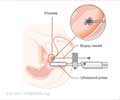Recent Research
Research is being carried out to improvise the PSA test and make it more reliable and sensitive. Studies are ongoing to evaluate the role of yearly screening using PSA and DRE in reducing a person’s risk of dying from prostate cancer.
a) It has been realized that a lot more cancers have been detected in the screened group than in the control group. However, more studies and follow-ups are required to arrive at a definite conclusion with regard to the decrease in deaths following screening.
b) Researchers are looking at the possibility of improving the PSA test as a diagnostic tool to screen prostate cancer. Besides, the possibility of PSA as a tool to detect various types of benign and malignant conditions of the prostate is also being regarded. Towards this end, the following parameters of the PSA is being closely studied:
- PSA velocity: PSA velocity refers to the change in PSA level with time. A sharp rise in PSA level must be suspiciously regarded as it could indicate the presence of a fast-growing cancer.
- PSA density: PSA density refers to a connection between the size of the prostate and the PSA levels. In a person with enlarged prostate, elevated PSA values may not be indicative of malignancy. But this proposal is debatable as it could lead to neglect of cancer in a person with enlarged prostate.
- Free and attached PSA–Free PSA is elevated in the benign conditions of the prostate. In those with malignancy, attached PSA levels are high and free PSA levels are low. Less than 10% of free PSA is generally considered to be indicative of cancer. Researchers are studying the possibility of using this difference to better detect cancer.
- PSA Normal values - Currently 4.0ngms/ml is used as the cut- off value. The possibility of lowering this value to 2.5 or 3.0 ngs/ml is being considered. However this may cause added problems as it may lead to over diagnosis, false positive results and unnecessary treatments.
PSA molecules, such Pro-PSA, and other markers such as urinary PCA3 gene and Galectin-3 are some of the new markers that are being studied and will replace PSA in time to come.

![Prostate Specific Antigen [PSA] & Prostate Cancer Diagnosis Prostate Specific Antigen [PSA] & Prostate Cancer Diagnosis](https://images.medindia.net/patientinfo/1920_500/prostate-specific-antigen.jpg)








